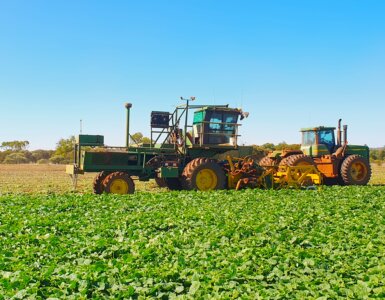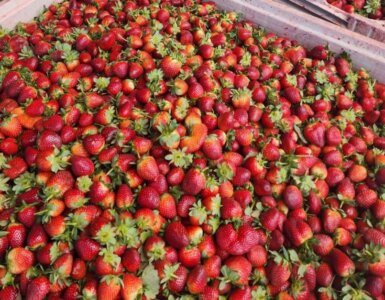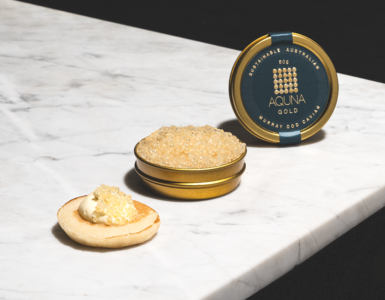Honey is a true gift of nature and the busy bees that make it are impressive and fascinating. That love of bees has taken Charlie Casido around the world – until the 1990s when he and his wife decided to migrate to Australia from the Philippines.
It was at Orange in the Central West of NSW they started their business called Australian Queen Bee Line, selling honey, queen bees and offering pollinating services. There’s a lot to navigate as an apiarist at the moment – especially with the Varroa Mite emergency response in full swing. Charlie Casido and his daughter Carol offer a rare insight into the incredible world of bees.

The Casido family keep hives in some amazing places like national parks and private properties. From there, these amazing creatures can travel up to 5 kilometres in a single day’s work. The spoils of that work – honey – travels all around the world as Queen Bee Line products become more and more sought after.
“It’s nice to see mum and dad come a long way. They’ve migrated here and my brother and I were born and raised in Orange and Bathurst. It’s nice to see how much people really love a genuine product,” says Carol.
It’s nice to see how much people really love a genuine product.
The family also breeds queen bees for sale. “We produce around 40,000 to 45,000 bees a year. That’s for the market here in Australia and overseas. We supply to the Middle East and also Canada and Asia, but most are local,” explains Charlie.
“Every state has different biosecurity protocols. So, we are not able to go into WA but prior to the Varroa Mite this year, we could ship our queen bees around Australia and overseas,” says Carol.
Healthy hives and hobby beekeepers
The Varroa Mite is the biggest threat to the nation’s bee population at the moment. “I’m experienced with Varroa in Saudi Arabia and the Philippines. So, it’s normal for me because I’ve already experienced it,” explains Charlie. He says if a hive is infected with the mite, the bees that hatch are unable to fly, which is catastrophic for the industry. The NSW Government is handling the treatment of the incursion by setting up biosecurity zones, containing the infected hives and euthanising the bees.
“As beekeepers, we learn why it’s important to keep healthy hives. Not just for your own business but the whole industry,” says Carol.
“I would encourage all beekeepers to learn. There is a biosecurity course available,” adds Charlie.

A widespread infection would impact all of us, not just beekeepers. Bees are essential for the pollination of crops and regeneration of vegetation eaten by livestock. It’s a great time as consumers to think about ways we can support the industry.
As beekeepers, we learn why it’s important to keep healthy hives. Not just for your own business but the whole industry.
“There may be consumers who think they want to try beekeeping as well. You really do have to do your research. It’s not a bad thing to reach out to a local beekeeper,” says Carol.
“We are very fortunate, we get a lot of hobby beekeepers who reach out. They get queens from us, and you start to build a relationship but it’s a matter of registering your hives, maintaining healthy hives, signing up for biosecurity courses. Really committing to it is part of it. When you have neglectful hobby hives, it puts the bee industry at risk.”
Know your honey
For those not quite wanting to make their own honey just yet, we can also do our bit at the shops by looking for 100% pure Australian honey. Even better, know where your honey is coming from. Some cheaper imports may be diluted with sugar syrup or have other additives mixed in to make it go further.

“We see customers come through saying their honey has crystallised with sugar particles. They start to question if it’s authentic. It is. When we pack honey, we have to warm it to a certain temperature to bottle it,” says Carol.
“In Orange especially, it’s so cold, it’s going to crystallise. That’s actually a natural part of honey and I think a lot of people don’t know what to do with it. You can put the whole bucket in some warm water, and it’ll soften.”
That’s actually a natural part of honey and I think a lot of people don’t know what to do with it.
“Our Australian honey is very low moisture content. That’s why the crystallisation is easy,” says Charlie.
Busting myths
Charlie believes after all this time in the industry, he is still learning every day. From battling floods and fires, there have been many challenges. During the most recent bushfires in the region, their honey took on a natural smoky flavour and there’s simply no way to reverse that.
“I think people believe producing honey is really easy. For us, 17 years down the track, it actually takes a lot of effort. People who have amateur hives will understand that as they sit and wait patiently for their honey. For us, it’s on a bigger scale but dad has had to push weekends and do long days and late nights. It takes a lot of manpower and a lot of perseverance to do beekeeping in Australia, says Carol.

I think people believe producing honey is really easy. For us, 17 years down the track, it actually takes a lot of effort.
Charlie and Carol say we’re in a great place in Australia to see safe and successful beekeeping continue for generations to come. Thank goodness for that.
Hear more stories just like Charlie’s by subscribing to the Telling Our Story podcast on iTunes and follow podcast host Angie Asimus on Instagram for more updates.







































Add comment